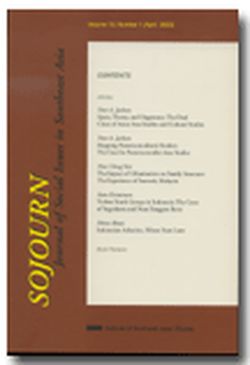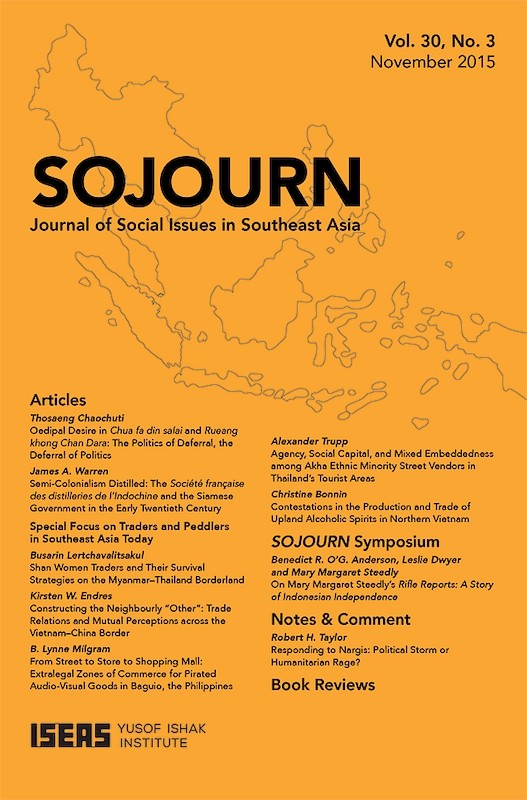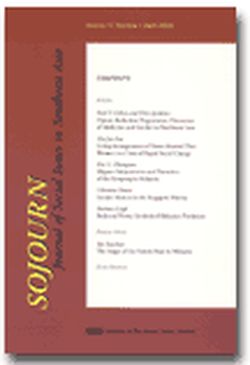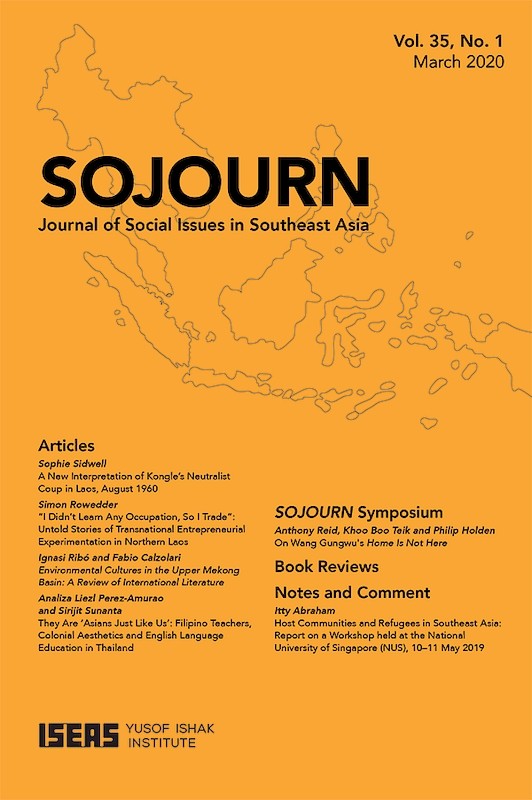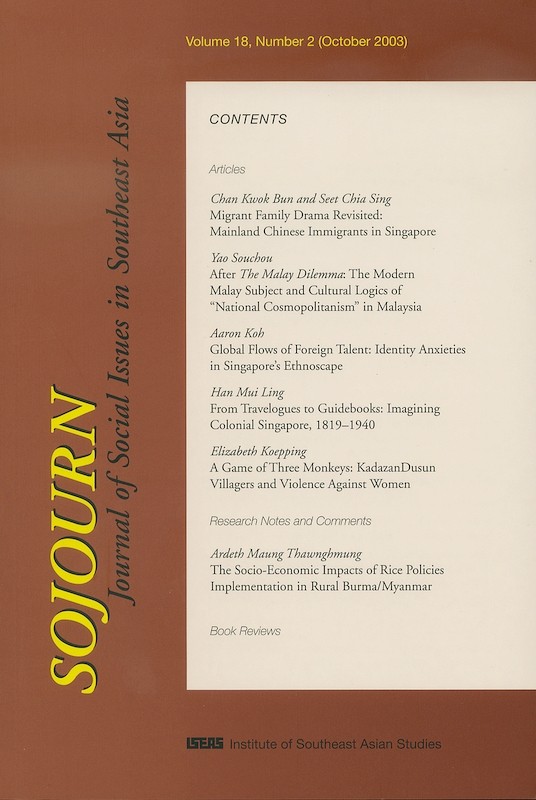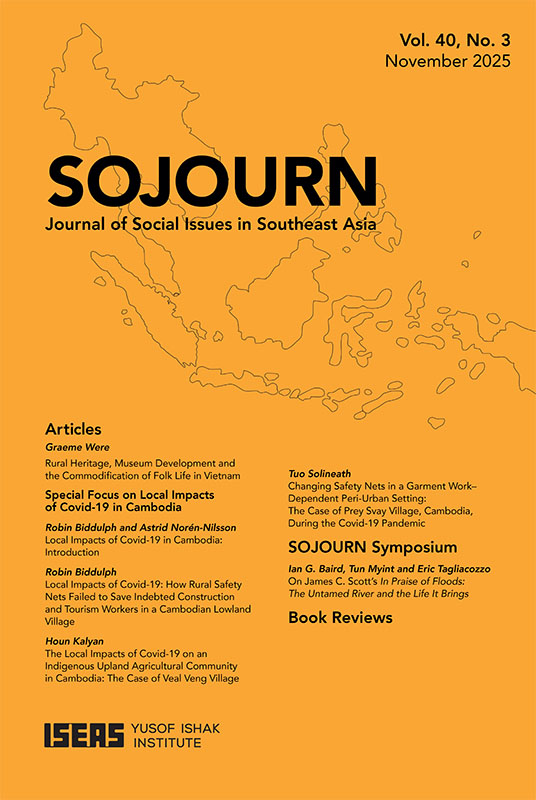SOJOURN: Journal of Social Issues in Southeast Asia Vol. 21/1 (April 2006)
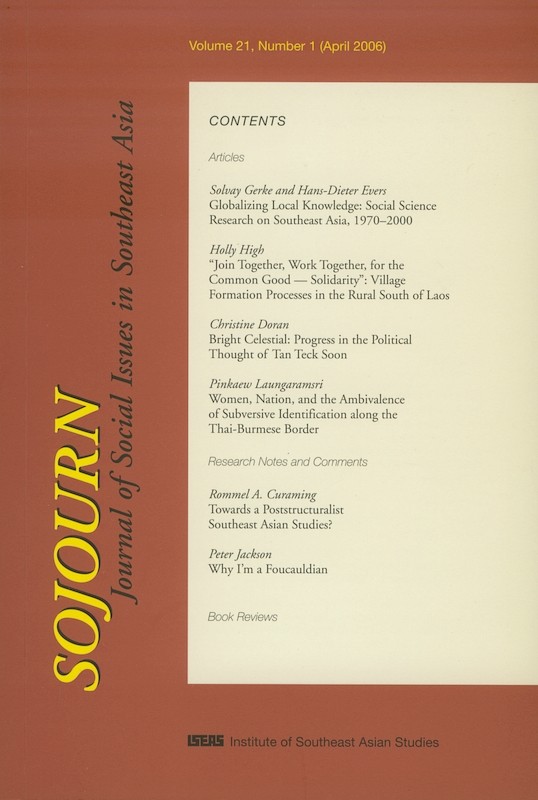
Date of publication:
July 2006
Publisher:
Institute of Southeast Asian Studies
Number of pages:
141
Code:
SJ21/1
Contents
-
SOJOURN: Journal of Social Issues in Southeast Asia Vol. 21/1 (April 2006)
[Whole Publication] -
Preliminary pages
- ARTICLES
-
Globalizing Local Knowledge: Social Science Research on Southeast Asia, 1970-2000, by Solvay Gerke, Hans-Dieter Evers, authors see abstractNew knowledge is produced at great speed and fed into a global epistemic machinery of data banks, publications, and think tanks. In reverse, global knowledge is absorbed and used locally. Locally produced knowledge is on the increase as society moves towards a knowledge society. Social science research adds to knowledge of societies. If it is locally produced, it can be interpreted as reflexive modernization in so far as it provides paradigms for an interpretation of social processes and structures. This article traces the development of social science research on Southeast Asia and its increasing localization. A model is developed to summarize the output of interpretative schemes and published documents. Statistical data on the global absorption of locally produced knowledge are used to measure the extent of the move towards a knowledge society. Singapore, Brunei, Malaysia, and the Philippines have relatively high local social science output, whereas Indonesia, Cambodia, Vietnam, Myanmar, and Laos have low output rates. We diagnose four different paths from 1970 to 2000: Indonesia shows a stable high level of dependence, Malaysia and the Philippines are increasing local output but also increasing dependence, whereas Singapore is increasing output with decreasing dependence on global social science knowledge.
-
Join Together, Work Together, for the Common Good Solidarity: Village Formation Processes in the Rural South of Laos, by Holly High, author see abstractThis article explores the concept of the solidary village in contemporary Laos. It argues that the village today is not a fixed, primordial entity, but a continually emergent formation resulting from numerous processes, including but not limited to modern state processes. The notion of village circulates in the ambiguous common sense pertaining to rural Laos, in the attitudes, expectations, representations, and regulated require-ments of the rural, in what I term village formation projects. Case studies of village formation projects in one village in southern Laos illustrate not only the importance of the village concept, but also its indeterminacy and fluidity, and the ensuing difficulty of achieving the solidarity and cooperative donation required by poverty reduction policies.
-
Bright Celestial: Progress in the Political Thought of Tan Teck Soon, by Christine Doran, author see abstractTan Teck Soon was an influential Chinese scholar who contributed to the reformist impulse within the Chinese community in Singapore around the turn of the 20th century. This article calls attention to the importance of Tans work, which has been comparatively neglected by historians. It examines the nature of Tans political thought and provides a detailed analysis of two significant articles which were markers of his political development. The article emphasizes the salience of concepts of progress in Tans thinking, and charts the radicalization of his political ideas during the first decade of the 20th century.
-
Women, Nation, and the Ambivalence of Subversive Identification along the Thai-Burmese Border, by Pinkaew Laungaramsri, author see abstractThis article focuses on the making of Shan nationalism as a subversive identification against the Burmese regime and its gender ambivalence. By employing a feminist critique of nationalism, it explores the relation-ship between women and nation within the movement for political independence among the Shan people. The article examines the way in which the imagined Shan nation has become a gender construct and is negotiated and contested by Shan women. Through the experiences of the displacement of Shan women exiles, the tension between the master and marginal narratives about the nation has become crucial to how women (re)construct their transnational identities. As womens voices are far from homogeneous and coherent, multiple and divergent experiences characterize the distinctive ways in which Shan women have come to terms with their ambivalent identities.
- RESEARCH NOTES AND COMMENTS
-
Towards a Poststructuralist Southeast Asian Studies?, by Rommel A Curaming, author see abstractThis article is specifically in response to the two thought-provoking articles (Space, Theory and Hegemony: The Dual Crises of Asian Area Studies and Cultural Studies and Mapping Poststructuralisms Border: The Case for a Poststructuralist Area Studies) published in Sojourn: Journal of Social Issues in Southeast Asia in April 2003. It questions the viability of the authors attempt to integrate poststructuralism in an effort to re-invent conventional area studies, such as Southeast Asian Studies. It argues that the justification for the call for a poststructuralist area studies is flawed and that while there is a need to re-invent area studies, it cannot be safely accomplished by appropriating poststructuralism as a theoretical support. This is primarily because the opposing epistemological foundations of the two projects area studies and poststructuralism will tend to cancel each other out and analysis therefore that purports to combine the two contains contradictions. It further argues that poststructuralism can be more useful in playing the role of a higher-order critique of as adjunct to, rather than as an integral part of area studies.
-
Why I'm a Foucauldian, by Peter A Jackson, author
- BOOK REVIEWS
-
BOOK REVIEW: The Leiden Legacy: Concepts of Law in Indonesia. By Peter Burns, by Mason C Hoadley, author
-
BOOK REVIEW: Hard Bargaining in Sumatra: Western Travelers and Toba Bataks in the Marketplace of Souvenirs. By Andrew Causey, by Glenn Reeves, author
-
BOOK REVIEW: Acting Authoritatively: How Authority Is Expressed through Social Action among the Bentian of Indonesian Borneo. By Kenneth Sillander, by Reed L Wadley, author
-
BOOK REVIEW: Investing in Miracles: El Sjaddai and the Transformation of Popular Catholicism in the Philippines. By Katherine L Wiegele, by John J Carroll, SJ, author

